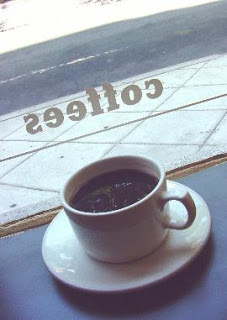Neuropsychology Abstract of the Day: Desires for Caffeine
Okay, sitting in a coffeehouse right now, how could I not choose this abstract!

West O, & Roderique-Davies G. Development and initial validation of a caffeine craving questionnaire. Journal of Psychopharmacology. 2008 Jan; 22(1):80-91.
Department of Psychology, HaSS, University of Glamorgan, Pontypridd, CF37 1DL, UK.
Craving for caffeine has received little empirical attention, despite considerable research into the potential for caffeine dependence. The main aim of this study was to develop, and initially validate, a multi-item, multidimensional instrument to measure cravings for caffeine. Participants were 189 caffeine consumers who completed the Questionnaire of Caffeine Cravings, which was based on the Questionnaire of Smoking Urges (QSU), in one of five naturally occurring periods of abstinence; 1-15 min; 16-120 mins; 3-7 h; 12-48 h and +48 h. Exploratory factor analysis suggested a three-factor solution best described the data; Factor 1 reflected strong desires, intentions and positive reinforcement; Factor 2 reflected mild/general positive and negative reinforcement and Factor 3 reflected functional/mood-based negative reinforcement. Significantly higher Factor 1 and Factor 2 scores were recorded for high frequency users; significantly higher Factor 1 and Factor 3 scores were recorded as a function of increased levels of dependence. Duration of abstinence did not significantly effect cravings across all three factors. Regression analyses suggested level of dependence best predicted both current cravings and frequency of daily use. These findings suggest caffeine cravings may be conceptualized multidimensionally and further validates the use of multidimensional, multi-item instruments. Cravings for caffeine may manifest and be detected across varying levels of dependence and, frequency of use and independently of duration of abstinence.
PMID: 18187535 [PubMed - in process]
(photo by anthony risser, copyright 2008, philadelphia)
- Coffee Helps Women Cope With Stressful Meetings But Has The Opposite Effect On Men
For men working together, stress plus coffee could be toxicIf a meeting becomes stressful, does it help, or make things worse, if team members drink lots of coffee? A study by Lindsay St. Claire and colleagues that set out to answer this question has...
- Scary Health Messages Can Backfire
A short while ago there was a shocking advert on British TV that used slow motion to illustrate the bloody, crunching effects of a car crash. The driver had been drinking. Using these kind of scare tactics for anti drink-driving and other health issues...
- In Search Of The Big One
Nice, nasty, charming, chatty, vulpine, vulgar...when we get down to it, just how many personality traits are there? It's a question psychologists and philosophers have been wrestling with for centuries. In recent years, researchers have tended to...
- Abusing Chocolate And Bipolar Diagnoses
Is chocolate a legal "social drug" of abuse in the same category as nicotine, caffeine, and alcohol? Do you hang out at chocolate cafes with the purpose of becoming high or intoxicated? No? Have you heard of cancer-related deaths due to chocolate or...
- Abstract Of The Day: Alzheimer Disease
Cummings JL, McRae T, & Zhang R. (2006). Effects of donepezil on neuropsychiatric symptoms in patients with dementia and severe behavioral disorders. American Journal of Geriatric Psychiatry, 14(7), 605-612. Departments of Neurology and Psychiatry and...
